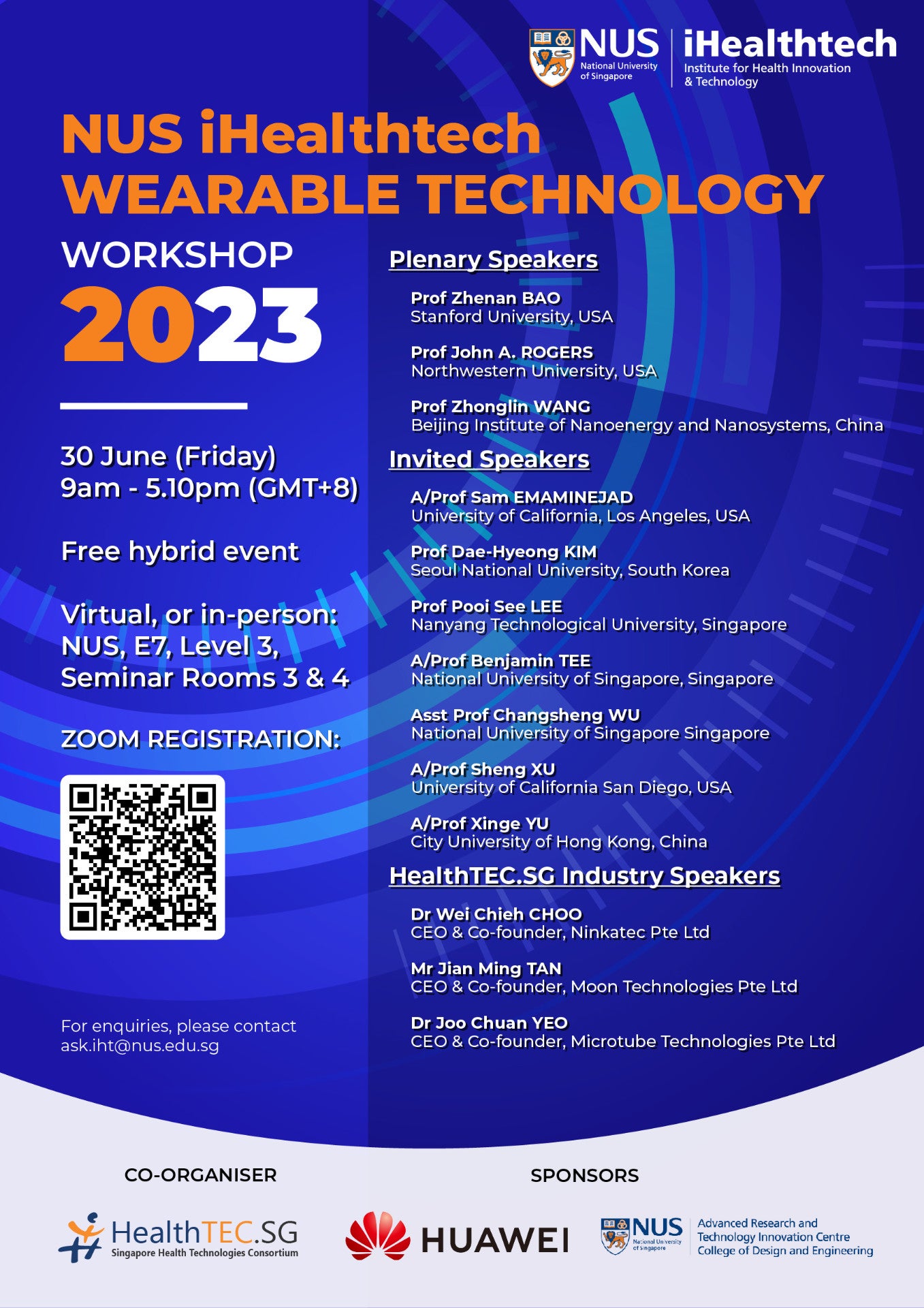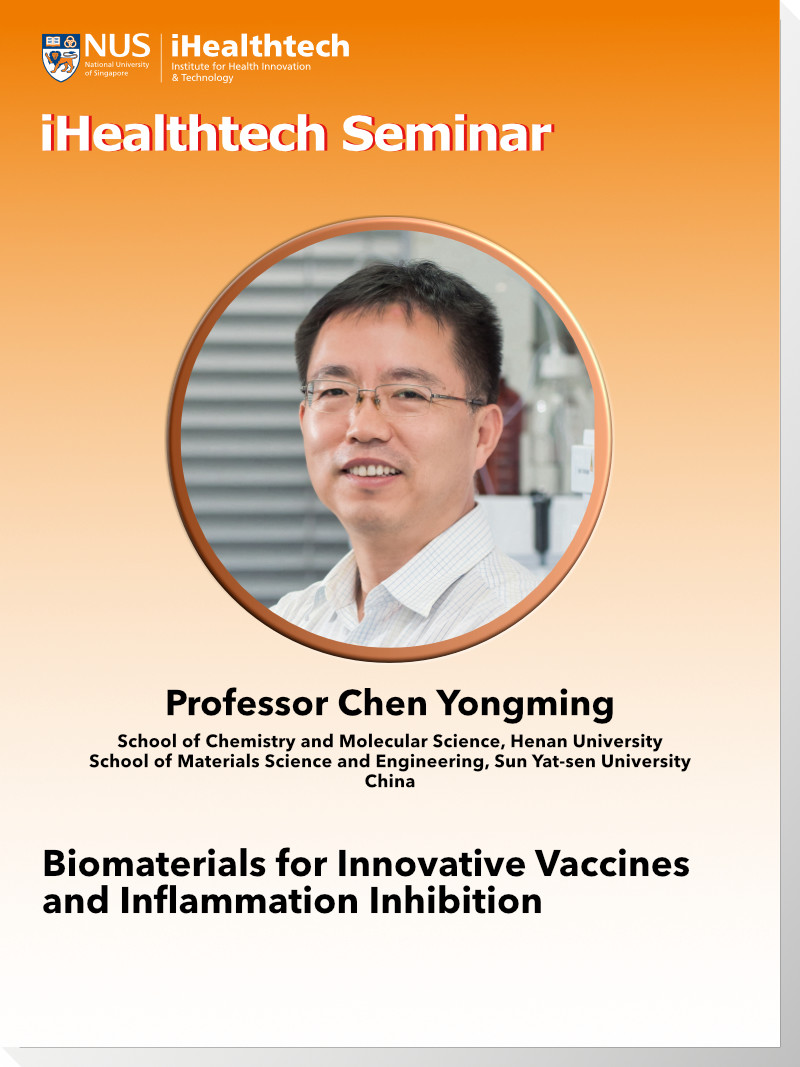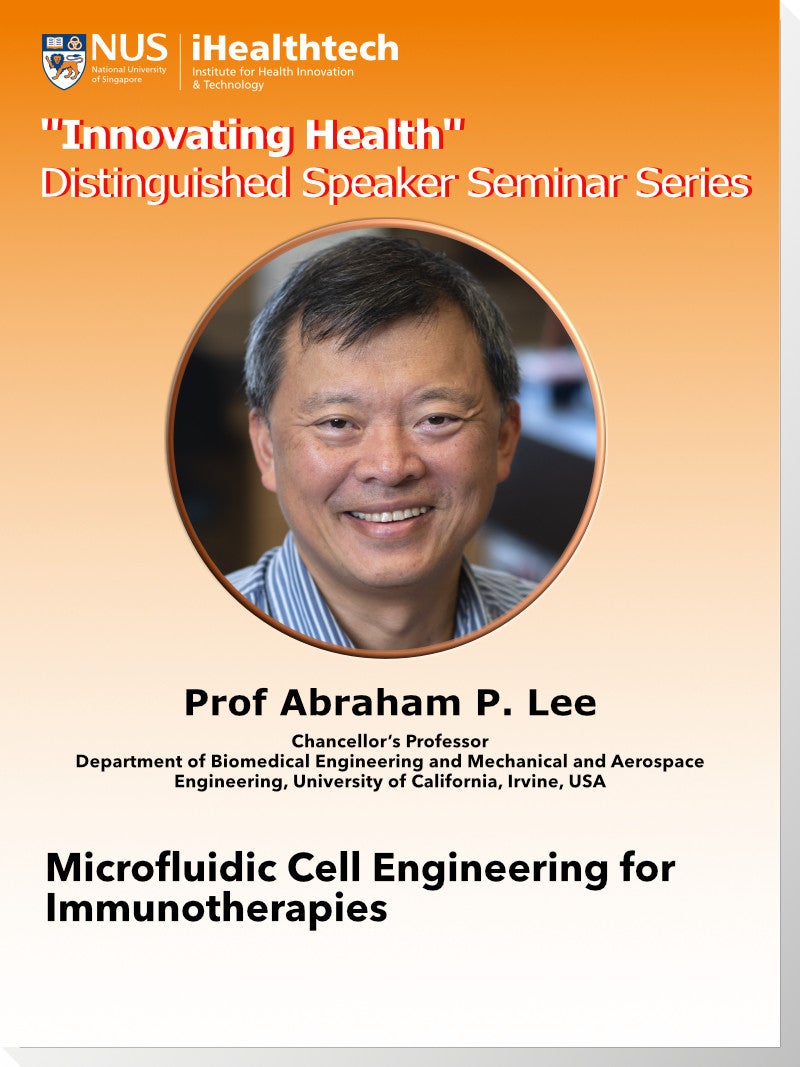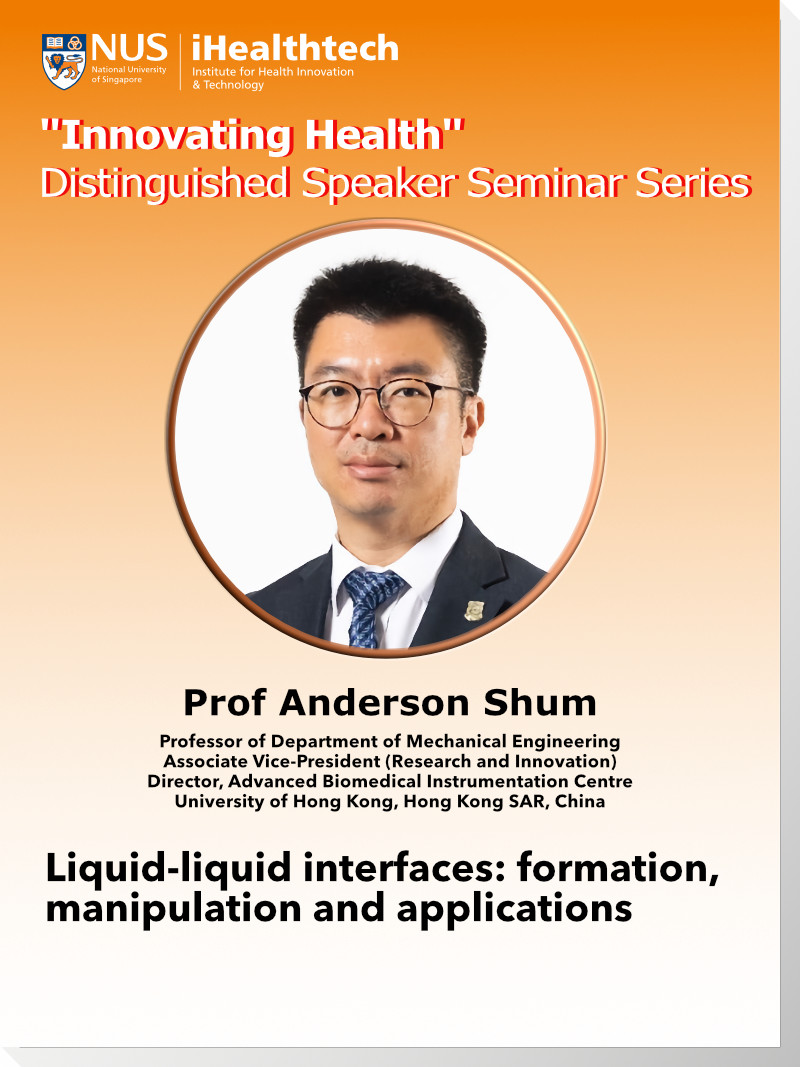Wearable Technology Workshop 2023
We are pleased to invite you to register and attend the WEARABLE TECHNOLOGY WORKSHOP 2023. Invited renowned experts in the field will share their invaluable insights and knowledge at this onsite workshop.
Distinguished plenary speakers include Professor Zhenan Bao (Stanford University), John Rogers (Northwestern University), and Zhonglin Wang (Beijing Institute of Nanoenergy & Nanosystems).
In addition to our plenary speakers, we have also invited an impressive lineup of outstanding academic and industry speakers, including Sam Emaminejad (UCLA), Dae-Hyeong Kim (Seoul National University), Pooi See Lee (NTU), Benjamin Tee (NUS), Changsheng Wu (NUS), Sheng Xu (UCSD), Xinge Yu (CityU HK), Wei Chieh Choo (Ninkatec CEO) and Jian Min Tan (Moon Technologies CEO).
This exciting event is organised by NUS iHealthtech and HealthTEC.SG Consortium. We are grateful for our generous sponsor, Huawei, whose support has made this event possible.
We look forward to welcoming you to this transformative event!
About the workshop
The WEARABLE TECHNOLOGY WORKSHOP is an annual event by iHealthtech with the goal of fostering collaborative partnerships among engineers, clinicians, data scientists, and industry partners to develop innovative healthcare solutions that will have a positive impact on patients. This workshop serves as a platform for renowned experts in wearable technology to come together and exchange invaluable insights and knowledge regarding the latest advancements in cutting-edge wearable technologies. Through this collaborative effort, the workshop strives to drive the development and implementation of transformative wearable solutions in the healthcare industry.
For any enquiries about the workshop, please email ask.iht@nus.edu.sg.
🗓30 June 2023
📍NUS, College of Design and Engineering, E7 Engineering in Medicine Building, Level 3, Seminar Rooms 3 & 4
🖋️Registration: [https://forms.office.com/r/3dvqLTN0Ab]
📙Download Poster
PAGE CONTENT
- Speakers
- Scientific Programme
- Speaker Bio & Talk Title/Abstract
PLENARY SPEAKERS
Prof Zhenan BAO, Stanford University, USA
Prof John A. ROGERS, Northwestern University, USA
Prof Zhonglin WANG, Beijing Institute of Nanoenergy and Nanosystems, China
INVITED SPEAKERS
Prof Sam EMAMINEJAD, University of California, Los Angeles (UCLA), USA
Prof Dae-Hyeong KIM, Seoul National University, South Korea
Prof Pooi See LEE, NTU, Singapore
A/Prof Benjamin TEE, NUS, Singapore
Asst Prof Changsheng WU, NUS, Singapore
A/Prof Sheng XU, UCSD, USA
A/Prof Xinge YU, City University of Hong Kong, China
COMMERCIALIZATION OF WEARABLE TECHNOLOGIES (HealthTEC.SG)
Dr Joo Chuan YEO, Microtube Technologies Pte Ltd
Mr Jian Ming TAN, Moon Technologies Pte Ltd
Dr Wei Chieh CHOO, Ninkatec Pte Ltd
SCIENTIFIC PROGRAMME
|
Time (SGT)
|
Programme
|
|
9:00 am – 9:15 am
|
Welcome Address
Prof Lim Chwee Teck, NUS iHealthtech, Singapore
|
|
|
PLENARY LECTURES
|
|
9:00 am – 9:15 am
|
Welcome Address
Prof Lim Chwee Teck, NUS iHealthtech, Singapore
|
|
9:15 am – 10:00 am
|
Skin-inspired bioelectronics
Prof Zhenan BAO, Stanford University, USA
|
|
10:00 am – 10:45 am
|
Soft, skin-interfaced devices for health monitoring and haptic interactions
Prof John A. ROGERS, Northwestern University, USA
|
|
10:45 am – 11:00 am
|
Coffee Break
|
|
11:00 am – 11:45 am
|
Nanogenerators for implantable medical devices and self-powered biosensors
Prof Zhonglin WANG, Beijing Institute of Nanoenergy and Nanosystems, China
|
|
|
INVITED TALKS
|
|
11:45 am – 12:15 pm
|
Intrinsically-soft conductors for conformal tissue-device interfacing
Prof Dae-Hyeong KIM, Seoul National University, South Korea
|
|
12:15 pm – 12:45 pm
|
Plenty of room under the skin: A wearable’s perspective
A/Prof Sheng XU, UCSD, USA
|
|
12:45 pm – 1:30 pm
|
|
|
1:30 pm – 2:00 pm
|
Ubiquitous bioelectronics: Personalizing medicine for everyone
A/Prof Sam EMAMINEJAD, UCLA, USA
|
|
2:00 pm – 2:30 pm
|
Soft electronics for technology-assisted healthcare
Prof Pooi See LEE, NTU, Singapore
|
|
2:30 pm – 3:00 pm
|
Intelligent skin electronics for healthcare monitoring and XR
A/Prof Xinge YU, City University of Hong Kong, China
|
|
3:00 pm – 3:30 pm
|
Providing a clinician’s touch through wearable technologies
A/Prof Benjamin TEE, NUS iHealthtech, Singapore
|
|
3:30 pm – 4:00 pm
|
Wearable elastography via surface mechano-acoustic sensing for continuous monitoring of tissue stiffness
Asst Prof Changsheng WU, NUS iHealthtech, Singapore
|
|
4:00 pm – 4:15 pm
|
|
|
|
COMMERCIALIZATION OF WEARABLE TECHNOLOGIES (HealthTEC.SG)
|
|
4:15 pm – 4:30 pm
|
Stretch for fun, health and avatar!
Dr Joo Chuan YEO, CEO & Co-founder, Microtube Technologies Pte Ltd
|
|
4:30 pm – 4:45 pm
|
Spatial computing in medical
Mr Jian Ming TAN, CEO & Co-founder, Moon Technologies Pte Ltd
|
|
4:45 pm – 5:00 pm
|
More than “having an eye” on the patient: Wearables and IOT in remote care
Dr Wei Chieh CHOO, CEO & Co-founder, Ninkatec Pte Ltd
|
|
5:00 pm – 5:10 pm
|
|
|
End of Workshop
|
PLENARY LECTURES
Professor Zhenan Bao
K.K. Lee Professor of Chemical Engineering, by courtesy Professor of Chemistry, Materials Science and Engineering, Stanford University
|
 |
Skin-inspired bioelectronics
Skin is the body’s largest organ. It is responsible for the transduction of a vast amount of information. This conformable, stretchable, self-healable and biodegradable material simultaneously collects signals from external stimuli that translate into information such as pressure, pain, and temperature. The development of electronic materials, inspired by the complexity of this organ, is a tremendous, unrealized materials challenge. However, the advent of organic-based electronic materials may offer a potential solution to this long-standing problem. Over the past decade, we have developed materials design concepts to add skin-like functions to organic electronic materials without compromising their electronic properties. An important discovery was nano-confined polymer semiconductors and conductors. This finding addressed the long-standing challenge of conformational disorder-limited charge transport with polymer electronic materials. It enabled us to introduce various skin-like functions while simultaneously increasing polymer electronic material charge transport ability. The above fundamental understanding further allowed us to develop direct photo-patterning methods and fabrication processes for high-density large-scale soft stretchable integrated circuits. In addition, we developed various soft sensors for continuous measurements, including pressure, strain, shear, temperature, electrophysiological and neurotransmitter sensors. The above sensors and integrated circuits are the foundations for soft bioelectronics and enable a broad range of new tools for medical devices, robotics and wearable electronics.
Biography
Bao is K.K. Lee Professor of Chemical Engineering and, by courtesy, a Professor of Chemistry and Professor of Material Science and Engineering at Stanford University. She was Department Chair of Chemical Engineering from 2018-2022. Bao founded the Stanford Wearable Electronics Initiate (eWEAR) in 2016 and is the faculty director. She has been a CZ Biohub investigator since 2022.
Prior to joining Stanford in 2004, she was a Distinguished Member of Technical Staff in Bell Labs, Lucent Technologies from 1995-2004. She received her PhD in Chemistry from the University of Chicago in 1995. She has close to 700 refereed publications and over 80 US patents with a Google Scholar H-Index 199. She is one of the Clarivate Citation Laureates in Chemistry for her pioneering work on skin-inspired electronics.
Bao is a member of the National Academy of Engineering, the American Academy of Arts and Sciences and the National Academy of Inventors. She is also a foreign member of the Chinese Academy of Science.
Bao is a recipient of the VinFuture Prize Female Innovator 2022, the ACS Chemistry of Materials Award 2022, MRS Mid-Career Award in 2021, AICHE Alpha Chi Sigma Award 2021, ACS Central Science Disruptor and Innovator Prize in 2020, the Gibbs Medal by the Chicago session of ACS in 2020, Wilhelm Exner Medal by Austrian Federal Minister of Science 2018, ACS Award on Applied Polymer Science 2017, L’Oréal-UNESCO For Women in Science Award in the Physical Sciences 2017, AICHE Andreas Acrivos Award for Professional Progress in Chemical Engineering in 2014, ACS Carl Marvel Creative Polymer Chemistry Award in 2013, ACS Cope Scholar Award in 2011, Royal Society of Chemistry Beilby Medal and Prize in 2009, IUPAC Creativity in Applied Polymer Science Prize in 2008.
K.K. Lee Professor of Chemical Engineering, and by courtesy Professor of Chemistry, Materials Science and Engineering
Website: baogroup.stanford.edu
Director, Stanford Wearable Electronics Initiative (eWEAR)
Website: ewear.stanford.edu
|
Professor John A. ROGERS
Louis Simpson and Kimberly Querrey Professor, Northwestern University
|
 |
Soft, skin-interfaced devices for health monitoring and haptic interactions
Over the last decade, new concepts in materials science, mechanical engineering, electrical engineering and advanced manufacturing have led to the emergence of diverse, novel classes of ‘biocompatible’ electronic, microfluidic and microelectromechanical systems with skin-like physical properties. The results create vast opportunities in diagnostic, therapeutic and/or sensory devices with important, unique capabilities for applications in fitness/wellness, sports performance, clinical healthcare and virtual reality environments. This talk describes the key ideas and presents some of the most recent examples in (1) wireless, battery-free electronic ‘tattoos’ for continuous monitoring of vital signs in neonatal and pediatric intensive care, including active deployments in the most advanced hospitals in the US, Canada and Europe and clinics in multiple countries in Africa, (2) microfluidic platforms that can capture, manipulate and perform biomarker analysis on microliter volumes of sweat, with applications in precise hydration management in sports and fitness, including commercial devices featured on celebrity sports figures with Gatorade and (3) programmable vibro-haptic interfaces that support real-time patient feedback and enhanced experiences in virtual reality environments.
Biography
Professor John A. Rogers began his career at Bell Laboratories as a Member of Technical Staff in the Condensed Matter Physics Research Department in 1997 and served as Director from 2000 to 2002. He then spent thirteen years at the University of Illinois as the Swanlund Chair Professor and Seitz Materials Research Laboratory Director. In 2016, he joined Northwestern University as the Simpson/Querrey Professor, where he is also Director of the Institute for Bioelectronics. He has co-authored nearly 900 papers and is co-inventor of over 100 patents. His research has been recognized by many awards, including a MacArthur Fellowship (2009), the Lemelson-MIT Prize (2011), the Smithsonian Award for American Ingenuity in the Physical Sciences (2013), the Benjamin Franklin Medal (2019), and a Guggenheim Fellowship (2021). He is a member of the National Academy of Engineering, the National Academy of Sciences, the National Academy of Medicine and the American Academy of Arts and Sciences.
|
Professor Zhong Lin WANG
Beijing Institute of Nanoenergy and Nanosystems, Chinese Academy of Sciences, Beijing, China
School of Materials Science and Engineering, Georgia Institute of Technology, Atlanta, Georgia USA
|
 |
Nanogenerators for implantable medical devices and self-powered biosensors
A self-powered system can sustainably operate without an external power supply for sensing, detection, data processing and transmission. Nanogenerators (NG) were first developed for self-powered systems based on the piezoelectric effect and triboelectrification effect for converting tiny mechanical energy into electricity, which have applications in the Internet of things, environmental/infrastructural monitoring, medical science, environmental science and security. NGs have three major application fields: micro/nano-power sources, self-powered sensors and blue energy. We will present the applications of the NGs for harvesting body motion energy that will be used for medical science and bioengineering.
Biography
Dr Zhong Lin Wang is the Director of the Beijing Institute of Nanoenergy and Nanosystems and Regents’ Professor and Hightower Chair at Georgia Institute of Technology. Dr Wang pioneered the nanogenerators field for distributed energy, self-powered sensors and large-scale blue energy.
Dr Wang has received the Nano Research Award (2022), Celsius Lecture Laureate, Uppsala University, Sweden (2020); The Albert Einstein World Award of Science (2019); Diels-Planck lecture award (2019); ENI Award in Energy Frontiers (2018); The James C. McGroddy Prize in New Materials from American Physical Society (2014); and MRS Medal from Materials Research Soci. (2011). Dr Wang was elected as a foreign member of the Chinese Academy of Sciences in 2009, a member of the European Academy of Sciences in 2002, an academician of Academia of Sinica 2018, an International fellow of the Canadian Academy of Engineering 2019, a fellow of National Academy of Inventors 2022. Dr Wang is the founding editor and chief editor of the international journal Nano Energy, which now has an impact factor of 19.0.
|
INVITED TALKS
Professor Dae-Hyeong Kim
Center for Nanoparticle Research, Institute for Basic Science, & School of Chemical and Biological Engineering, Seoul National University
|
 |
Intrinsically-soft conductors for conformal tissue-device interfacing
Recent advances in flexible and stretchable electronics have attracted significant attention due to their potential applications in personalised bio-integrated healthcare devices. The mechanical mismatch between conventional rigid electronic devices and soft human tissues often causes various issues, such as a low signal-to-noise ratio of biosensors, inflammations on the tissue interfacing with the bioelectronics, skin irritations in the case of long-term wearing of the device and ineffective electrical stimulations in feedback therapies. Ultra-flexible and stretchable bioelectronic devices have a low system modulus and intrinsic softness and, thereby, have the potential to solve these issues. Nanomaterials and their composites with the elastomeric matrix are particularly promising material candidates for realising this soft bioelectronics concept. This talk presents the unique strategies in synthesising nanomaterials, processing as stretchable functional nanocomposites, seamless integration into soft bioelectronics, and their wearable and/or implantable device applications. These efforts have combined recent nanomaterials and soft electronics breakthroughs and are expected to address unmet clinical challenges.
Biography
Dae-Hyeong Kim obtained BS and MS in Chemical Engineering from Seoul National University, Korea, in 2000 and 2002, respectively. He received his PhD in Materials Science and Engineering from the University of Illinois at Urbana Champaign in 2009. From 2009 to 2011, he was a postdoctoral research associate at the University of Illinois. He joined Seoul National University in 2011 and is currently a professor at the School of Chemical and Biological Engineering of Seoul National University. He has been an associate director of the Center for Nanoparticle Research of the Institute for Basic Science (IBS) since 2017. He has been focusing on the research of nanomaterials and deformable devices and their application to bio-integrated and bio-inspired electronics. He has been recognized with several awards, including George Smith Award (2009), TR 35 Award (2011), Hong Jin-ki Creative Award (2015), SCEJ Award (2016), and Korea Young Scientist Award (2017). He was also selected as one of the highly cited researchers by Clarivate Analytics in 2018, 2019, 2020, 2021, and 2022.
|
Associate Professor Sheng XU
Jacobs Faculty Scholar, University of California San Diego
|
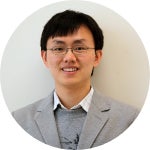 |
Plenty of room under the skin: A wearable’s perspective
The use of wearable electronic devices that can acquire vital signs from the human body noninvasively and continuously is a significant trend for healthcare. The combination of materials design and advanced microfabrication techniques enables the integration of various components and devices onto a wearable platform, resulting in functional systems with minimal limitations on the human body. Physiological signals from deep tissues are particularly valuable as they have a stronger and faster correlation with the internal events within the body compared to signals obtained from the surface of the skin. In this presentation, I will demonstrate a soft ultrasonic technology that can noninvasively and continuously acquire dynamic information about deep tissues and central organs. I will also showcase examples of this technology’s use in recording blood pressure and flow waveforms in central vessels, monitoring cardiac chamber activities, and measuring core body temperatures. The soft ultrasonic technology presented represents a platform with vast potential for applications in consumer electronics, defense medicine, and clinical practices.
Biography
Dr Sheng Xu holds the position of Associate Professor and Jacobs Faculty Scholar at the University of California San Diego. He earned his B.S. degree in Chemistry from Peking University and his Ph.D. in Materials Science and Engineering from the Georgia Institute of Technology. Subsequently, he engaged in postdoctoral studies at the Materials Research Laboratory at the University of Illinois at Urbana-Champaign. The focus of his research group is the development of new materials and fabrication methods for flexible health monitoring and energy harvesting devices. His research has been presented to the United States Congress as testimony to the significance and impact of funding from the NIH. He has received numerous awards and honors, including the NIH Maximizing Investigators’ Research Award, NIH Trailblazer Award, Sloan Fellowship, Wellcome Trust Innovator Award, MIT Technology Review 35 Innovators Under 35, IEEE EMBS Technical Achievement Award, ISBE Outstanding Youth Award, ETH Zürich Materials Research Prize for Young Investigators, and MRS Outstanding Early Career Investigator Award.
|
Associate Professor Sam Emaminejad
Electrical and Computer Engineering Department, University of California, Los Angeles (UCLA)
Founder and Director of the Interconnected & Integrated Bioelectronics Lab (I²BL)
|
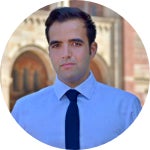 |
Ubiquitous Bioelectronics: Personalizing Medicine for Everyone
In this talk, I will discuss how bioelectronics can be positioned as ubiquitous biomarker data harvesters to enable molecular diagnostics at the point-of-person for personalized medicine. Aligned with this vision, I will present the central theme of my research program: developing new classes of bioelectronics that autonomously measure biomarker molecules in various biofluids to provide deep insight into our body’s dynamic chemistry and facilitate timely actionable feedback. These bioelectronics can be either integrated with users’ daily experience and surroundings, for example in a mobile format, for frequent monitoring and decentralized testing—or they can be directly integrated with body, in wearable and implantable formats, for continuous monitoring. I will provide example technologies developed by my lab that can increase our capacity for harvesting biomarker data by orders of magnitude for real-time intervention and generation of high quality, large multidimensional data sets. I will specifically present:
· A low-cost, yet powerful, digital microfluidic technology, namely ferrobotics, that miniaturizes and automates complex assays within a palm-sized circuit-board-based platform and produces lab-grade test results (e.g., reducing NAAT test/person cost by 300-fold, Science Robotics 2020 & Nature 2022).
· A series of bioanalytical smartwatches, microneedles, and touch-based interfaces that non/minimally-invasively measure circulating biomarker molecules such as metabolites, hormones, pharmaceuticals, in real-time (PNAS 2020 & 2022, Nature Comm. 2020, Science Advances 2020 & 2022) along with associated clinical data on stress monitoring and precision dosing.
· A library of soft, stretchable, tissue-interfacing bioelectronics that feature clinically favorable interfacial materials (including brittle noble metals) and deliver high biosensing/stimulation performance without being affected by strain and corrosion (Science 2022).
I will conclude by discussing how through convergent and multidisciplinary efforts (including engineering, medicine, and data science), we can harness such technologies for point-of-person health monitoring and realize personalized health at the population scale.
Biography
Professor Sam Emaminejad is an associate professor in the Electrical and Computer Engineering department at UCLA, the founder and director of the Interconnected & Integrated Bioelectronics Lab (I²BL), and an elected senior member of the National Academy of Inventors. Sam received his BASc (2009) and MS/PhD (2011/2014) degrees in Electrical Engineering from the University of Waterloo and Stanford University, respectively. Prior to joining UCLA, he was a joint-postdoctoral scholar at UC Berkeley and Stanford School of Medicine. Professor Emaminejad has received numerous honors and awards, including the NSF CAREER, NSF Smart and Connected Health (SCH), Natural Sciences and Engineering Research Council (NSERC) scholarship, Microsoft Merit, the Brain & Behavior Research Foundation’s NARSAD Young Investigator award, PhRMA Research Starter Grant (Translational Medicine and Therapeutics Program), Cystic Fibrosis Foundation Research Grant, PATHS-UP Faculty Innovation, Young Alumni Achievement Medal (University of Waterloo), EMBS MNM 2022 Early Career (CADMIM), UCLA Innovation Fund, and CNSI Noble Family Innovation Fund. He has also been awarded a “Distinguished Young Investigator Award” for leading a multi-center program on remote patient monitoring with UCLA, Intermountain Healthcare and Stanford School of Medicine. Professor Emaminejad’s research has been featured by the National Science Foundation and National Academy of Engineering and widely reported by various media outlets, including Nature, Science, BBC, Time, The Wall Street Journal, Newsweek, etc.
|
Professor Pooi See LEE
School of Materials Science and Engineering, Nanyang Technological University, Singapore
|
 |
Soft electronics for technology-assisted healthcare
A seismic shift in the rapid emergence of health tech is driven by digital evolution, coupled with an ageing population and rising health consciousness. This has encouraged the development of wearable devices, which facilitate digital therapeutics, point-of-care diagnostics, continuous monitoring and rehabilitation. We developed a myriad of flexible and stretchable platform technology for detecting strain, pressure, temperature, humidity and even aroma sensing. In this talk, I’ll discuss our research progress in soft electronic materials and devices for health tech, particularly for detecting neuromuscular degeneration. Biomechanical actuated sensors can be used for healthcare, such as Kirigami structured printable piezoelectric sensors for wearable gait analyzer was demonstrated. In addition, we have developed wearable, stretchable batteries to mitigate the issues of power needs in portable wearable devices.
Biography
Professor Pooi See Lee is the President’s Professor in Materials Science & Engineering at Nanyang Technological University (NTU), Singapore. She received her PhD degree from the National University of Singapore in 2002. Her current research focuses on developing stretchable elastomeric composites for electronics and energy devices, human-machine interface, sensors and actuators, and hybrid materials for soft robotics. Professor Lee received the Nanyang Research Award in 2016 and the Nanyang Award for Innovation and Entrepreneurship Award 2017. She was elected the Fellow of the National Academy of Inventors in 2020 and MRS Fellow in 2021. She is currently the Senior Editor of ACS Energy Letters and serves on the editorial advisory board for several journals.
|
Associate Professor Xinge YU
Biomedical Engineering, City University of Hong Kong
Associate Director of the CAS-CityU Joint Lab on Robotics
Associate Director of Hong Kong Centre for Cerebro-cardiovascular Health Engineering
|
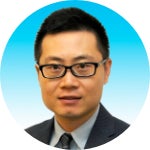 |
Intelligent skin electronics for healthcare monitoring and XR
Soft bio-integrated electronics have attracted great attentions due to the advantages of soft, lightweight, ultrathin architecture, and stretchable/bendable, thus has the potential to apply in various areas, especially in the field of biomedical engineering. By engineering the classes of materials processing and devices integration, the mechanical properties of the flexible electronics can well match the soft biological tissues to enable measuring bio signals and monitoring human body health.
In this report, we will present materials, device structures, power delivery strategies and communication schemes as the basis for novel soft bio-integrated electronics. For instance, we will discuss a wireless, battery-free platform of electronic systems and haptic interfaces capable of softly laminating onto the skin to communicate information via spatio-temporally programmable patterns of localized mechanical vibrations. The resulting technology, which we refer as epidermal VR, creates many opportunities where the skin provides an electronically programmable communication and sensory input channel to the body, as demonstrated through example applications in social media/personal engagement, prosthetic control/feedback and gaming/entertainment. Other demonstrations will include a flexible bio piezoelectric microsystems for tissue pathology biopsies (cancer diagnosis), and skin like patches as sweat sensors for healthcare monitoring and energy harvesting
Biography
Xinge Yu is currently an Associate Professor of Biomedical Engineering at City University of Hong Kong (CityU), Associate Director of the CAS-CityU Joint Lab on Robotics, and Associate Director of Hong Kong Centre for Cerebro-cardiovascular Health Engineering. Dr Yu is also the recipient of Innovators under 35 China (MIT Technology Review), NSFC Excellent Young Scientist Grant (Hong Kong & Macao), New Innovator of IEEE NanoMed, MINE Young Scientist Award, Gold Medal in the Inventions Geneva, CityU Outstanding Research Award etc. Xinge Yu’s research group is focusing on skin-integrated electronics and systems for VR and biomedical applications. He has published 150 papers in Nature, Nature Materials, Nature Biomedical Engineering, Nature Machine Intelligence, Nature Communications, Science Advances etc.
|
Associate Professor Benjamin C.K. TEE
Materials Science and Engineering Department, National University of Singapore, Singapore
|
 |
Providing a clinician’s touch through wearable technologies
The growth of flexible and wearable electronics commensurate with the proliferation of microelectronic devices is enabling high impact applications in healthcare and robotics. However, as such electronic devices increase in number, an increasingly urgent need to create materials and devices that can be part of a circular or self-repairable economy becomes critical. In this talk, I will discuss using organic hybrid materials science and engineering approaches as a way to scale skin-like electronic devices for more sustainable technological and societal impact through self-healing or degradability.
Further, to scale-up to human-like performance, neuromorphic engineering provides an exciting avenue to mimic the high performance of the human nervous systems and sensors. Critically, the energy efficiency of the human neural networks for learning relies on event-driven, temporally encoded action potential streams. In this talk, I will discuss how we can digitize tactile information through inspiration from somatosensory neural science. For example, we have developed an asynchronous protocol for parallel transmission of tactile information in an artificial peripheral nervous system we call ACES: Asynchronously Coded Electronic Skins. The parallel transmission encodes spatial temporal information with very high temporal precision (sub-100ns) even when large numbers > 10,000 sensor nodes are transmitting simultaneously. Such systems can be interfaced with soft sensors or flexible/stretchable electronics to enable more intuitive robotics and healthcare applications.
Biography
Dr Benjamin C.K. Tee is Associate Professor in Materials Science and Engineering Department at the National University of Singapore. He is Vice Dean (Research) appointment in the College of Design and Engineering Dean’s Office and Associate Vice President of NUS Enterprise.
He leads the Sensors.AI Labs to develop technologies at the cutting edge of materials science, mechanics, electronics and biology, with a focus on sensitive skin-like electronic materials that has tremendous potential to advance robotics and healthcare technologies in an increasingly Artificial Intelligence (AI) era.
He was awarded the National Research Foundation Fellowship in 2017. He obtained his PhD at Stanford University, and was a Singapore-Stanford Biodesign Global Innovation Postdoctoral Fellow in 2014. He is an MIT TR35 Innovator (Global) in 2015 and listed as World Economic Forum’s Young Scientist of the year in 2019. He was featured by CNN International as one of their Tomorrow’s Hero series, by Channel News Asia International in the ASEAN’s Next Generation Leaders documentary and by BBC World Service Radio and National Geographic TV. He was also listed as Clarivate Highly Cited Researcher in 2021. He has co-founded two successful medtech companies and excited to tackle challenging needs in prosthetics, robotics and AI. He can be found on www.benjamintee.com.
|
Assistant Professor Changsheng WU
Department of Materials Science and Engineering, National University of Singapore
|
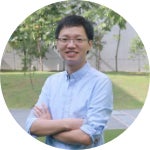 |
Wearable elastography via surface mechano-acoustic sensing for continuous monitoring of tissue stiffness
Recent progress in wearable devices provides new opportunities for precise, non-invasive, long-term recording of body mechanics. The soft device incorporating a single MEMS accelerometer captures subtle vibration of the skin with a resolution of 1×10-4 g/√Hz in the frequency range from 0 to 800 Hz. In this study, we introduce an on-body mechano-acoustic sensing technology based on a skin-mounted accelerometer array to assess the mechanical profiles of subdermal tissues in-vivo, similar to seismology. A system-level wearable device construction, optimized for a comfortable skin interface and high precision, incorporates a broadband dual-accelerometer sensor, an audio actuator, and a Bluetooth System-on-Chip and enables a wireless, automated operation. An automated algorithm, leveraging the spectral analysis of surface waves (SASW) methods, computes the depth-sensitive, elastic modulus information of the propagation media from the mechanical dispersion relationship. Comprehensive theoretical and experimental investigation on bi-layer phantom materials and biological tissues, with a storage moduli range of 19–1439 kPa, demonstrates the capability of rapid and robust evaluation of modulus in a depth range of 2–46 mm. The device identifies the softening of porcine tissues with increasing injected water content and the changes of modulus of muscle under different levels of tension. The results are in agreement with the in-parallel Ultrasound Elastography measurements. A quantitative assessment of the stiffness profile of the bicep brachii and rectus femoris muscle during gym exercises demonstrate the device operation in an ambulant environment for a non-invasive and continuous assessment of deep tissue stiffness with a temporal resolution of 0.5 s.
Biography
Dr Changsheng WU is an Assistant Professor in the Department of Materials Science and Engineering (MSE) at the National University of Singapore (NUS). He is also a PI in the Institute for Health Innovation and Technology and the N.1 Institute for Health, NUS. He received his PhD in MSE from Georgia Tech and carried out postdoctoral research in the Querrey Simpson Institute for Bioelectronics at Northwestern University. His research focuses on developing wireless wearables and intelligent robots for energy harvesting, biosensing and therapeutic applications, leveraging bioelectronics, materials science, and advanced manufacturing to create continuous, pervasive, and personalized digital health solutions.
|
Commercialization of wearable technologies (HealthTEC.SG Session)
Dr Joo Chuan YEO
CEO & Co-founder, Microtube Technologies
|
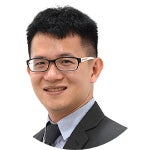 |
Stretch for fun, health and avatar!
From smartwatches and fitness bands to smart glasses and smart clothing, wearable technology is transforming the way we interact with technology and stay connected in a personalized and convenient manner. Essentially, this combines fashion and technology to offer seamless and continuous monitoring of the user’s health and lifestyle. To this end, our team has successfully produced microfiber sensors and actuators that are soft, thin, and stretchable, yet remarkably sensitive in their ability to detect minute movements, muscle contractions, and even vital signs. Additionally, their one-dimensional form factor permits seamless integration with complex three-dimensional architectures.
In this presentation, I will highlight the use of our wearables in the fitness domain, demonstrating exceptional accuracy in measuring muscle expansion and contraction. The implications for strength training are particularly noteworthy. Equipped with AI-powered recommendations, users can make informed decisions based on data that can be accessed anywhere, anytime. Apart from fitness, users can engage in an immersive experience of fun and games using their muscles as their controllers.
Moreover, our microfiber technology also has the capacity to serve as a soft actuator, enabling the development of wearable haptic technology. I will be presenting our research on the potential application of this technology in the metaverse.
Biography
Dr Joo Chuan Yeo has spent over 10 years of his career in deep technologies research in A*STAR and NUS, ranging from stretchable electronics, wearable sensors, microfluidic devices, and artificial intelligence. He has over 30 publications and 10 patents to his credit. His research has won him multiple awards, including IES Prestigious Engineering Achievement Award 2022, Human Catalyst Longevity Award 2021 and Material Research Society Graduate Student Award. Dr Yeo’s research has been translated in multiple companies, including Flexosense Pte Ltd and Microtube Technologies Pte Ltd.
|
Mr Jian Ming TAN
CEO & Co-founder, Moon Technologies
|
 |
Spatial computing in medical
Spatial Computing is the digitalisation of activities of machines, people, objects, and the environments in which they take place to enable and optimise actions and interactions. This talk will introduce what Moon Technologies has gone through, pertaining to research and creation of solutions for the medical industry to utilise Spatial Computing to generate actionable insights for healthcare practitioners, especially in an event of emergency. The talk will also cover areas of Human-Computer Interfaces (“HCI”) that makes solutions easily usable for healthcare practitioners. Case studies, Impacts and commercialisation of deep medical technologies will also be spoken of for audiences who are interested in the journey of a Medtech startup.
Biography
Jian Ming is currently the CEO of Moon Technologies, a funded startup co-founder that specialises in driving Spatial Computing and Augmented Reality in the medical industry for the purpose of improving better patient outcomes. He is also an inventor and owner of 2 patents (US & JP) revolving around Human-Computing Interface, specifically on eye-tracking & brain-computer interface. Current research areas include delivering attention-based Emergency Medicine Augmented Reality network protocol to facilitate communication between Paramedics and Trauma Surgeon and Augmented Reality Eye diagnosis for the purpose of Visual Acuity, Early Glaucoma risks, Strabismus and Diabetic Retinopathy.
|
Dr Wei Chieh CHOO
CEO & Co-founder, Ninkatec
|
 |
More than “having an eye” on the patient: Wearables and IOT in remote care
Remote consultations have increased in prominence since the pandemic and has been used in many diverse medical conditions. Together with the rise in popularity of remote consultations, there are currently many exciting tech developments that can be exploited to improve patient care. In this presentation, Dr Choo will share some clinical cases that highlight this trend.
Ninkatec provides home care for patients to live fulfilling lives. We provide cost-effective and personalized healthcare solutions for patients. We are guided by a patient-first approach to care with the patient’s well-being in our focus, and leverage on technology and clinical expertise to administer care in the comfort of your home.
Biography
Dr Choo is CEO and cofounder of Ninkatec. He has been a home care doctor since 2006, looking after patients in acute, post-discharge and long-term care settings. Prior to home care, Dr Choo’s previous roles have encompassed neuroscience research, as well as software development. At Ninkatec, Dr Choo combines his clinical and technical expertise to improve care to patients at home through conventional in-person consultations and remote visits augmented by wearables and medical IOT.
|
